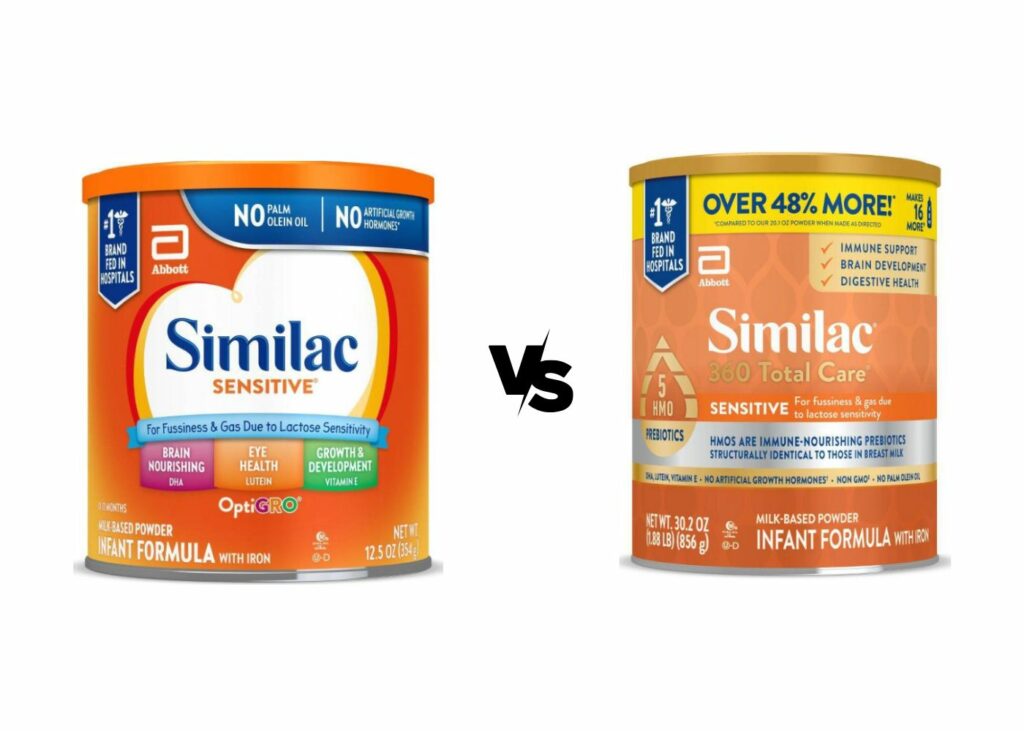
Key Differences Between Similac Sensitive and 360 Sensitive
| Similac Sensitive | Similac 360 Total Care Sensitive | |
|---|---|---|
| Designed for Lactose Sensitivity | ✔️ | ✔️ |
| Supports Brain Development | ✔️ | ✔️ |
| Supports Eye Development | ✔️ | ✔️ |
| No Palm Olein Oil | ✔️ | ✔️ |
| Milk Protein Isolate | ✔️ | ✔️ |
| Protein Content (per serving) | 2.1 grams | 2.1 grams |
| Carbohydrate Content (per serving) | 10.9 grams | 10.9 grams |
| Sources of Carbohydrates | Corn Syrup, Sugar | Corn Syrup, Sugar |
| Fat Content (per serving) | 5.4 grams | 5.4 grams |
| Sources of Fats | High Oleic Safflower, Soy, and Coconut Oil | High Oleic Safflower, Soy, and Coconut Oil |
| Contains Probiotics | ❌ | ❌ |
| Contains Prebiotics | Short-Chain Fructooligosaccharides | Five HMOs |
| Made in the USA | ✔️ | ✔️ |
| Gluten-Free | ✔️ | ✔️ |
| Non-GMO | ✔️ | ✔️ |
| Suitable for Sensitive Tummies | ✔️ | ✔️ |
| ⭐ Our Rating | 4.5/5 | 5/5 |
This article compares two similar formulas: Similac Sensitive and Similac 360 Total Care Sensitive.
Both formulas are designed to be gentle on baby’s tummies, but which one is better?
We will analyze their ingredients and nutritional compositions and give you our opinion on which one you should choose.
Let’s get after it!
*Related: Similac Sensitive vs Pro-Sensitive
Our Short Answer
Both formulas are extremely similar in terms of nutritional composition, but there is one important factor in which they differ:
Similac 360 Total Care Sensitive adds a key ingredient: HMOs or Human Milk Oligosaccharides, a series of prebiotics found in breast milk that are very beneficial to babies’ microbiota.
This is why Similac 360 Total Care Sensitive comes out on top in this comparison.
That said, we highly recommend looking at the alternatives below in the article. They are our recommendations for the formulas we would give to our baby.
With over 100,000 orders delivered globally since 2019, Organic's Best offers clean, safe, and nutritionally rich formulas and snacks.
Free shipping over $100, commitment to freshness and authenticity.
- Express delivery in 2 to 5 business days
- Sourcing from European manufacturers
- Minimum shelf life of 6 months
- Climate-Controlled Warehouse
Give your little one the best start.
CODE 'BLW' for a 5% discount in all orders
Overview of the Two Formulas
Similac Sensitive is designed for lactose sensitivity, supports brain and eye development, and has no palm olein oil.
Similac 360 Total Care Sensitive features HMOs, supports immune, brain, and digestive health, and is non-GMO.
Similac Sensitive
Similac Sensitive is an easy-to-digest, milk-based infant formula designed to alleviate fussiness, gas, or mild spit-up, common symptoms due to lactose sensitivity.
It boasts a unique blend of nutrients to support your baby’s brain and eye development.
This formula does not contain palm olein oil, allowing excellent calcium absorption.
This gluten-free formula is created to support your baby’s immune system and overall health.
Similac 360 Total Care Sensitive
Similac 360 Total Care Sensitive is a gentle baby formula that also targets common tummy troubles due to lactose sensitivity.
This product features an exclusive blend of five human milk oligosaccharides (HMOs) which are structurally identical to those found in breast milk.
The main selling point of this formula is its 360 Whole-Baby Support, providing nutrients specifically designed to back immune support, brain development, and digestive health.
Like Similac Sensitive, the Similac 360 Total Care Sensitive also emphasizes no artificial growth hormones and is non-GMO.
Nutritional Composition
Similac Sensitive and Similac 360 Total Care Sensitive have the same protein content, using milk protein isolate.
They both contain 10.9 grams of carbohydrates from corn syrup and sugar.
The fat content, 5.4 grams, is sourced from High Oleic Safflower, Soy, and Coconut Oil, without palm olein oil.
Protein Content
Both Similac Sensitive and Similac 360 Total Care Sensitive provide 2.1 grams of protein per serving.
The protein source in these formulas is Milk Protein Isolate.
Milk Protein Isolate is a high-quality protein source easily digestible for babies and less likely to cause allergic reactions.
Both formulas have the same protein source: Milk Protein Isolate.
They do not contain hydrolyzed protein, which means they are unsuitable for babies with cow’s milk protein allergies.
Similar Sensitive has a whey-to-casein ratio of 18:82 and Similac 360 Total Care of 20:80.
Carbohydrate Content
In terms of carbohydrates, both formulas contain 10.9 grams per serving.
The main sources of carbohydrates are Corn Syrup and Sugar.
The carbohydrates in these formulas come from lactose-free sources, making the formulas suitable for babies with lactose sensitivity.
Both formulas use corn syrup solids and sugar, which is not ideal. There are more neutral alternatives like maltodextrin or other starches without that amount of sugar.
Fats and Oils
For fats, both Similac Sensitive and Similac 360 Total Care Sensitive contain 5.4 grams per serving.
These fats come from High Oleic Safflower, Soy, and Coconut Oil.
Babies need fats for brain development and to facilitate the absorption of fat-soluble vitamins.
The absence of Palm Olein Oil in these formulas promotes better calcium absorption, aiding in developing strong bones and teeth.
Both baby formulas are exactly the same in terms of fat content, with the same sources and amounts.
No differences.
Probiotics and Prebiotics
Similac Sensitive contains Short-Chain Fructooligosaccharides.
Similac 360 Total Care Sensitive contains five HMOs (Human Milk Oligosaccharides), a more natural and healthier prebiotic.
No probiotics in either formula.
Probiotics and prebiotics are essential to a baby’s digestive health and immunity.
While neither Similac Sensitive nor Similac 360 Total Care Sensitive mention the inclusion of probiotics, both formulas contain Short-Chain Fructooligosaccharides (Similac Sensitive) and Human Milk Oligosaccharides (Similac 360 Total Care Sensitive).
These are recognized as prebiotics, which stimulate the growth of beneficial bacteria in the gut that aid digestion and help guard against harmful bacteria.
Best Places to Buy Similac Sensitive and 360 Total Care Sensitive


Similac 360 Total Care Sensitive
Buy Similac 360 Sensitive at Target
Buy Similac 360 Sensitive at Warlmart
Similac Sensitive
Buy Similac Sensitive at Target
Buy Similac Sensitive at Walmart
What are the best alternatives to Similac Sensitive and 360 Total Care Sensitive?
-
Buy at Organic's Best Buy at The Milky Box
HiPP Hypoallergenic (HA) Combiotic Formula is crafted for infants with milk protein sensitivities.
- Extensively Hydrolyzed Proteins
- Natural Prebiotics & Probiotics from real Breast Milk
- Lactose-Based
- Nutrient-Rich
- Free from artificial sweeteners, GMOs, gluten, soy, peanuts and egg
We earn a commission if you make a purchase, at no additional cost to you.
-
Buy at Organic's Best Buy at The Milky Box
Hipp Comfort is designed for tiny tummies struggling with colic and constipation while supporting natural digestion in the most nutritious and organic way.
- Hydrolyzed Milk Protein
- Reduced Lactose
- Natural Probiotics & Prebiotics
- Nutrient-Enriched
- Allergen-Free
We earn a commission if you make a purchase, at no additional cost to you.
– For babies requiring hypoallergenic formulas, our prime pick is Hipp HA. This formula is formulated specifically for babies prone to allergies, making it a great alternative for those sensitive to most standard baby formulas. *Read: Hipp HA vs Similac Alimentum
– For babies with non-CMPA-related digestive issues, options such as Hipp Comfort and Anti-Reflux will provide relief. These formulas alleviate discomfort, colic, constipation, and reflux issues. *Read: Hipp Comfort vs Hipp Anti-Reflux
– Finally, if your baby has not been diagnosed with Cow’s Milk Protein Allergy (CMPA), you can try high-quality goat milk formulas like Kendamil and Nannycare. Goat Milk formulas are often easier to digest than cow’s milk formulas and can be a nutritious substitute. *Read: Kendamil Goat vs Nannycare
Remember that switching formulas should always be done under the guidance of a pediatrician to ensure your baby gets the necessary nutrients for healthy growth and development.
Conclusion
As we said, the winner in this comparison is Similac 360 Total Care Sensitive for its use of HMOs.
We sincerely hope this post helps you make an informed decision.
We encourage you to keep reading about the possible alternatives since healthier and organic formulas without added sugars are available.
See you around!
We’re Maria and Alberto, a married couple and educators who are nutrition enthusiasts. Even before we had kids, we were already crazy about nutrition.
We’d read scientific articles, watch videos from nutritionists, and spend hours listening to nutrition podcasts.
Today, we continue doing this, but in a different way, as we’ve learned to sift through the noise and trends. Nutrition, like any other field of knowledge, the more you read and learn, the more you develop a comprehensive understanding of reality, and that’s what has happened to us.
Before having our first child, we focused on learning everything we could about child nutrition, using the same techniques we had already employed, backed by our extensive knowledge in nutrition.
Our mission is to help other parents with their children’s nutrition, to help them become the best versions of themselves.
If we are what we eat and drink, which is absolutely true, let’s do it right!


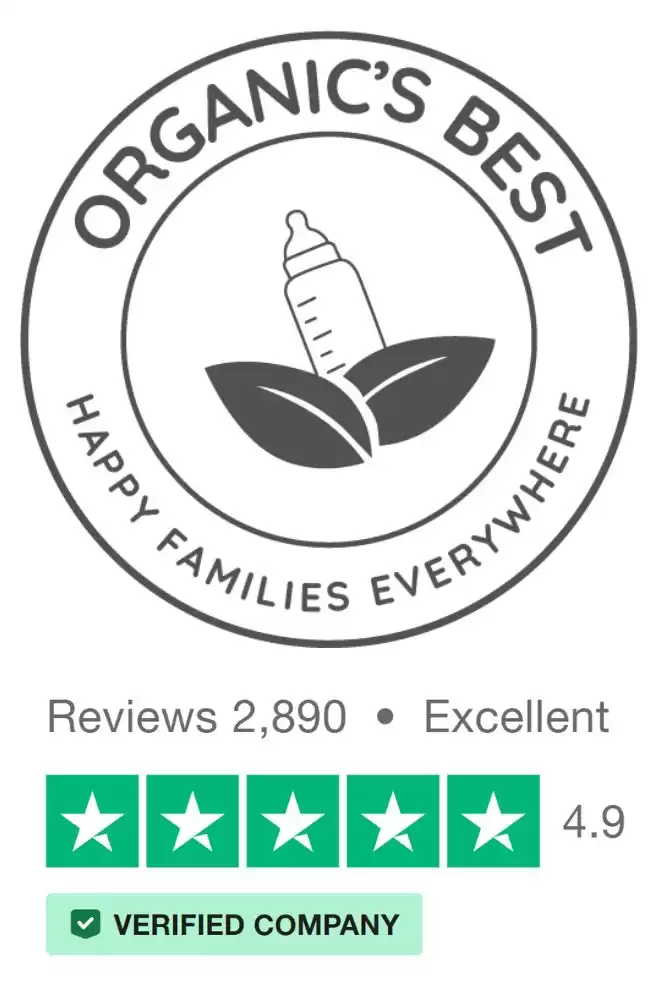
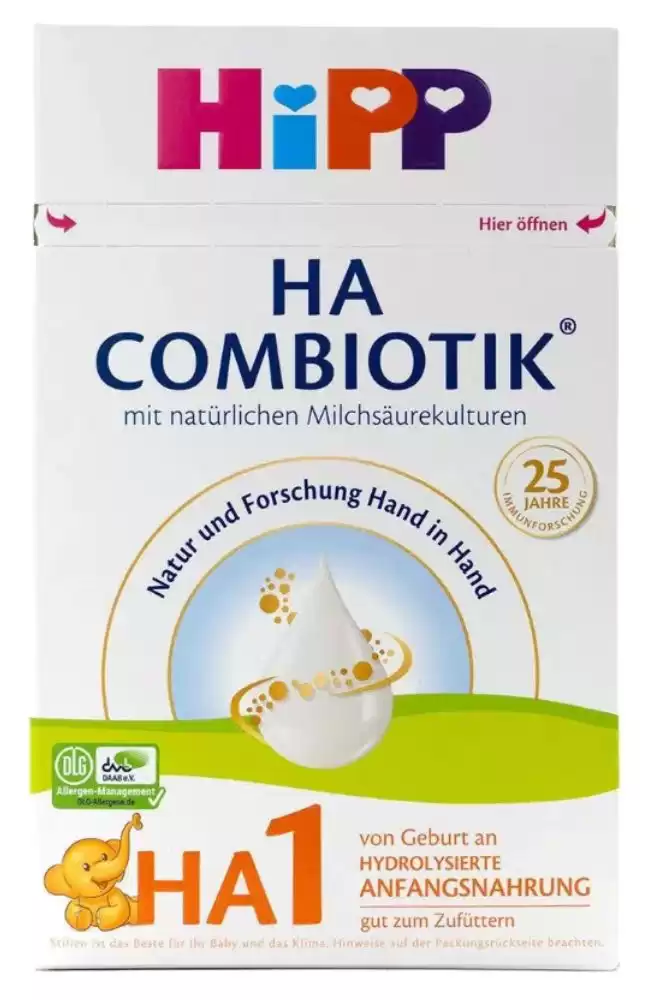
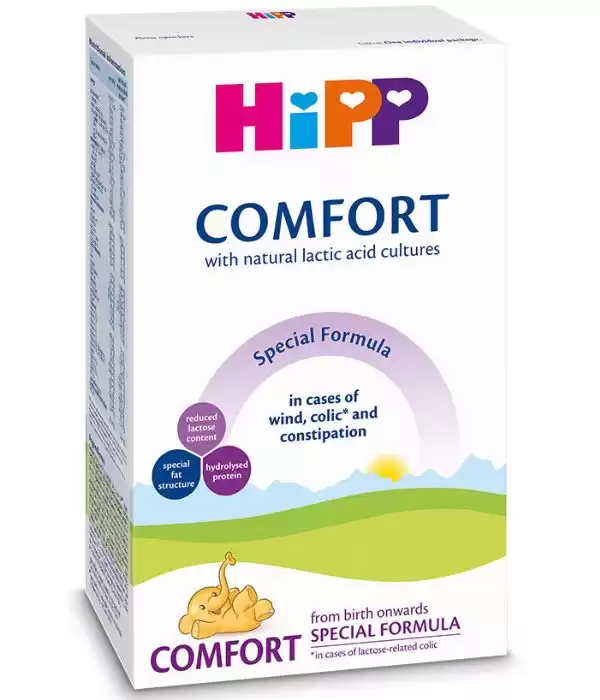
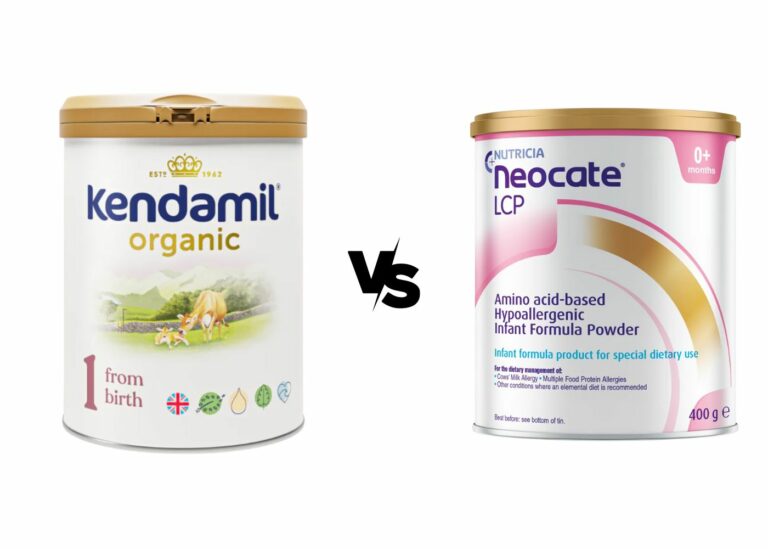
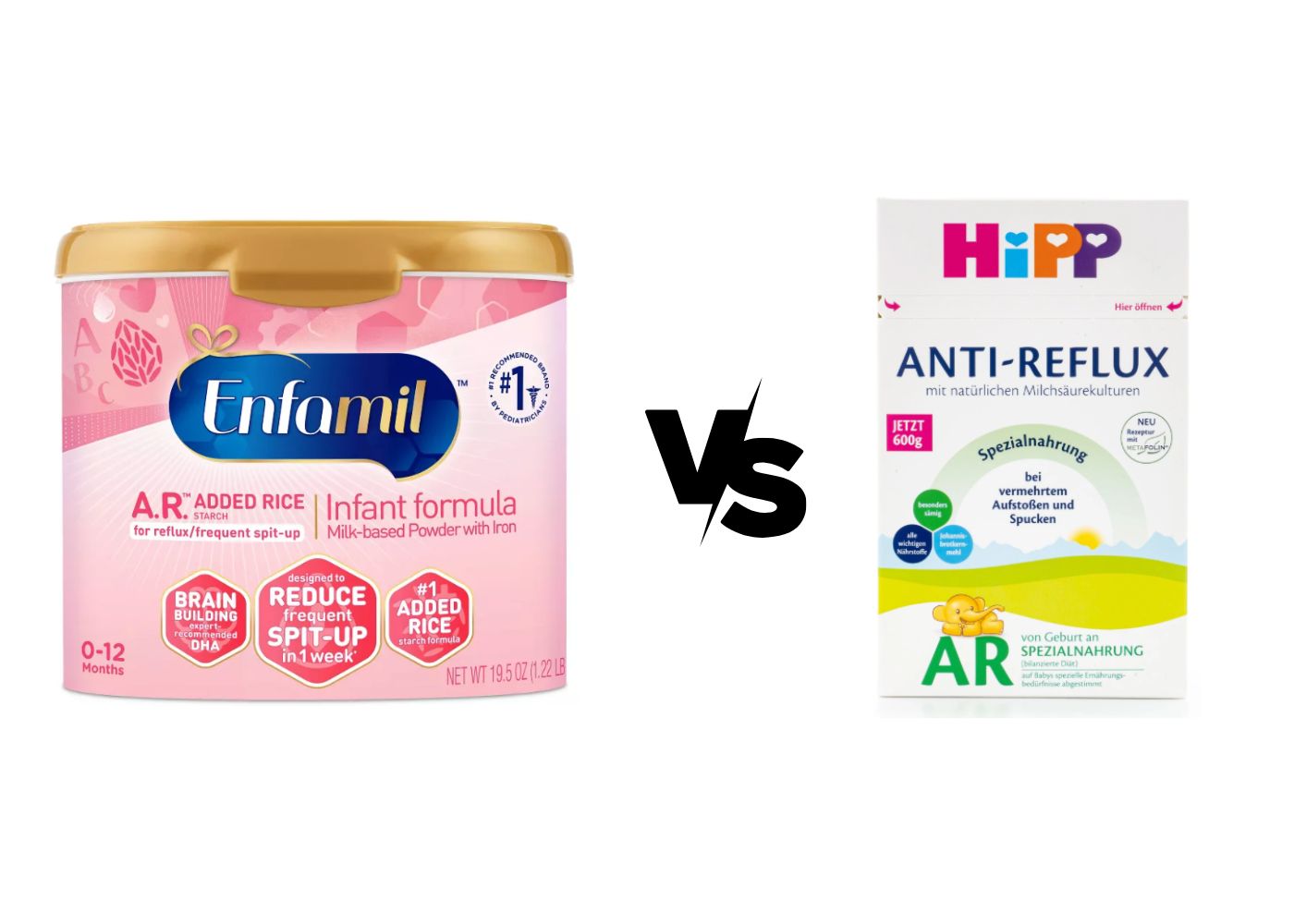
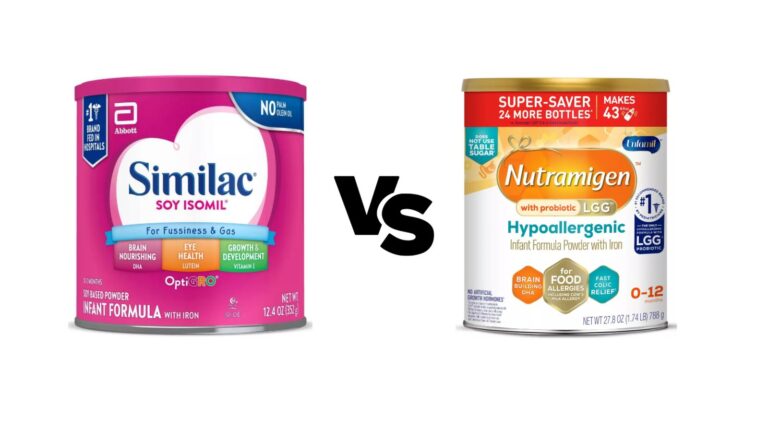
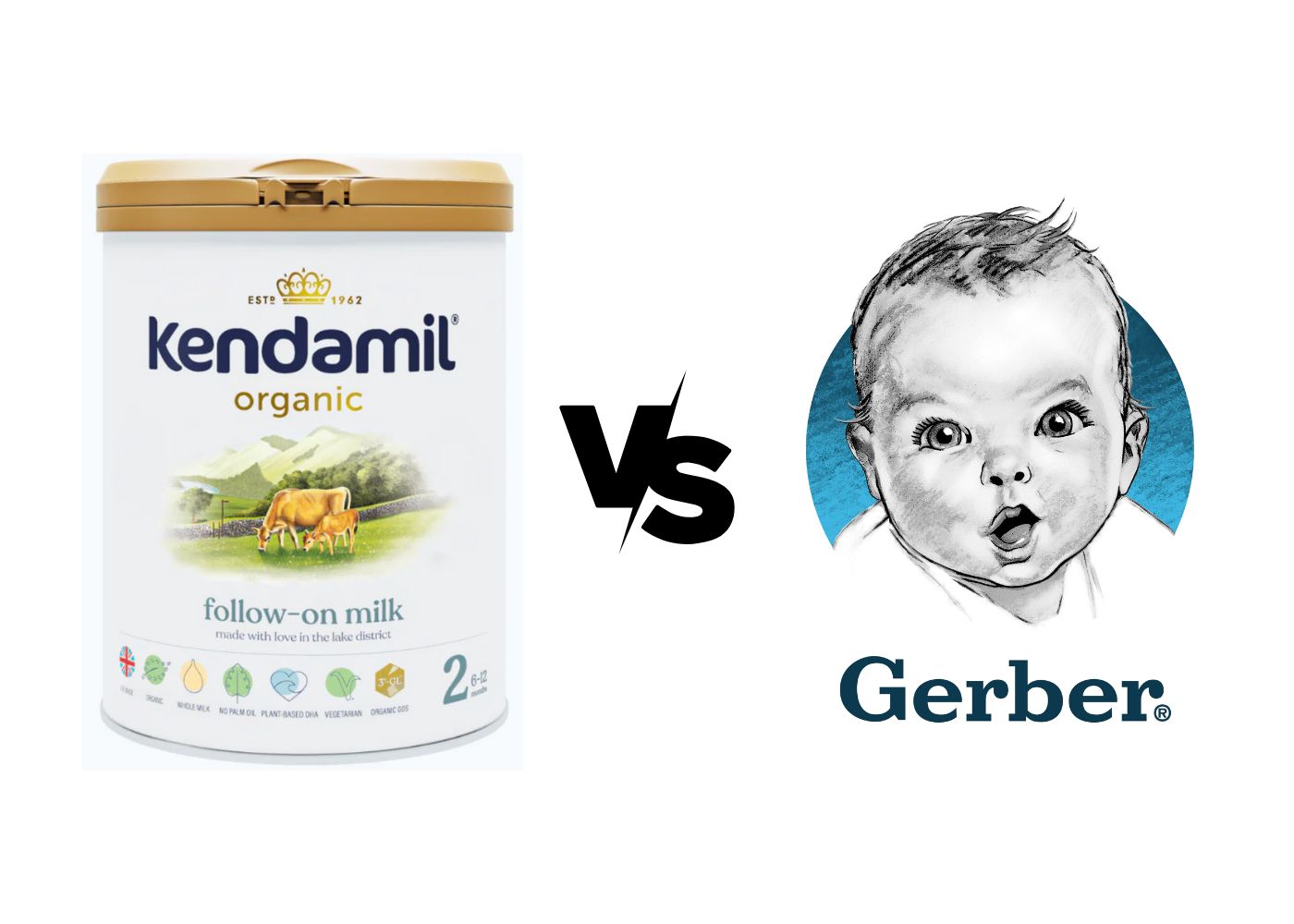
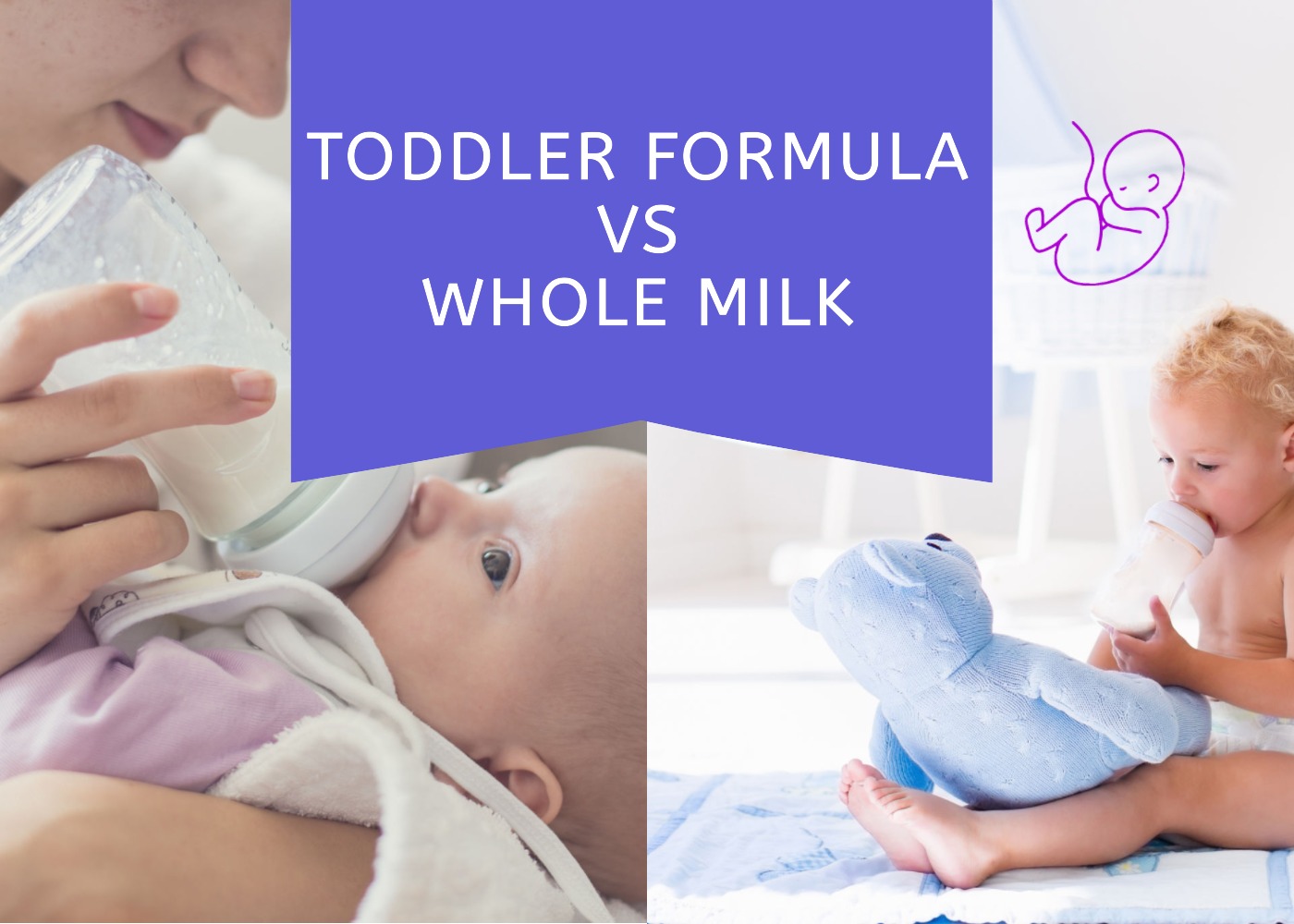

Great article! Is the whey to casin ratio different in the similiac 360 rtf versus the powder? I thought I read that ready to feeds are easier to digest?
I think my son is sensitive to lactose. He’s a preemie and we’ve tried so many formulas. He can tolerate cows milk formula but he occasionally breaks out and gets really gassy.
We tried the hypoallergenic formulas but due to his severe reflux they are just way too thin and even with thickening the bottles he still seems to spit up terribly and or refuse bottles.
Hi Breanna,
Thanks for the kudos on the article!
About the whey-to-casein ratio in Similac 360 formulas, Similac does not usually show their whey-to-casein ratio, but a good rule of thumb is that their formulas tend to hover around a 48:52 whey-to-casein ratio.
Regarding the digestibility of ready-to-feed (RTF) versus powdered formulas, it’s not always a clear-cut answer. Preparation is key. However, the Similac 360 Total Care Sensitive RTF version has maltodextrin, whereas its powdered form has corn syrup solids. This little change might just make the RTF version a bit gentler for tiny tummies, not to mention it’s a tad lighter on the sugar content too.
If you think your baby has lactose sensitivity, we usually recommend trying a formula made with goat’s milk, even if it has lactose, it often solves the problem.
If this still doesn’t work, what we recommend are formulas with prebiotics and probiotics, and that in turn have ingredients that are as pure as possible and without additives. In this case, Hipp Comfort, Hipp Anti-Reflux or Hipp HA are fantastic options.
Having said all this, we recommend you to ask your pediatritian if you can.
Don’t hesitate to reach out with more questions or updates, good luck!
Great article! Curious on your thoughts if ready to drink for either types is better since they don’t contain corn syrup? Thanks!
Hi Maggie,
Thank you, it means a lot!
The reason for the difference is mainly due to the way these formulas are prepared and used. The powdered formula needs to be mixed with water, so it uses corn syrup to help it dissolve better. The ready-to-feed formula is already liquid, so it uses maltodextrin to maintain a good consistency.
In terms of nutrition, we would prefer to give our baby maltodextrin, no questions asked, for two main reasons:
1. Corn syrup solids are at least 20% sugar and maltodextrin is less. This is also the reason why corn syrup solids have been found to increase the risk of obesity during infancy and toddlerhood.
2. It has a milder flavor and it’s usually easier to digest.
Hope this helps ^^
Are you familiar with the whey:Casien ratio on similac sensitive total care? I read whey is easier to digest, yet i think it has higher casien. My baby does well on similac sensitive total care so I’m trying to see what sensitivity should i assume he has since he does better on it. I’d like to find something similar but more organic
Hi Elizabeth,
Unfortunately, the whey-to-casein ratio of Similac Total Care Sensitive is nowhere to be found. Similac Sensitive has a 18:82 ratio, so we can assume that it’s probably the same in Similac Total Care Sensitive.
If your baby is doing great on Similac Total Care Sensitive, then it’s probably lactose sensitivity.
If you are looking for an organic option we recommend you try Hipp Comfort (it has reduced lactose and it is designed for being easy to digest), or Earth’s Best Sensitivity Formula. Both are great options.
Hope this helps!
Will be so thanks for an answer!My son is 4 month ,I read that Similac Sensitive is 0-12,but if I understood correctly Similac 360 total care sensitive is from 12 month ?Can I give second one to my 4 months son ?
Hi Angelina!
Of course you can give Similac 360 Total Care Sensitive to your 4-month-old.
The formula that is 12 months and older is called Go & Grow 360 Total Care.
Both Similac Sensitive and Similac 360 Total Care Sensitive are for 0 to 12 months.
Hope this helps.
This was a great article and thank you for sharing it! I was wondering if it is possible to give both to your baby?
Right now our daughter(3mo old) has been taking the Similac Sensitive. But we just got a present from a friend with a bunch of Similac 360 Total Care Sensitive. We were wondering if it will be ok to give her this as well. Do you think it will be ok?
Hi Vincent! Congratulations on your little one and thank you for your comment.
There is no medical reason why a healthy baby cannot drink a variety of infant formulas from one day to the next.
As with everything, try it and offer both at different days and see how she responds. Alternatively, you can also finish up with Sensitive and move on to 360 Total Care.
As we say in the article, 360 Total Care Sensitive is a more complete formula thanks to having better prebiotics, so as soon as you can make the swap, go for it!
Hope this helps ^^